What Is Green Friday?
Black Friday sales typically encourage rampant and pointless shopping, generating more waste before Christmas. We examine the environmental impact of the day, and showcase sustainable brands who are offering you a Green Friday alternative.
Is there anything more representative of rampant over consumption than Black Friday? Black Friday has come around again and has quickly became a yearly shopping tradition in the UK. The annual sales events take place traditionally the day after Thanksgiving but now span an entire week before the actual day. Retailers typically offer temptingly large savings on a lot of products to make the most of Christmas shoppers wallet’s. However, in the past Black Friday has merely meant people buying a lot of things they don’t need. Which as we all know, leads to bulging wardrobes, overflowing landfill and plastic in our oceans. Not to mention the unsafe conditions caused by hundreds of shoppers crammed into a small space, fighting over TVs!
Where Did Black Friday Come From?
Black Friday originated in the 1950s in the US. The day after American Thanksgiving was considered to be the official start of the holiday shopping season. The phrase itself signifies the day when retailers’ financial years would finally turn a profit, going from “in the red” to “in the black”. In recent decades this first day of holiday shopping has increasingly been marked by massive discounts, long store opening hours and online shopping sales. It’s also becoming more heavily marketed around the world, extending from a single day to a weekend and even a week’s worth of discounts.
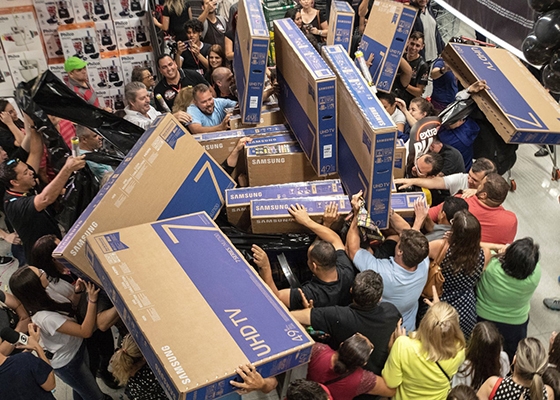
Image: Black Friday in Sao Paolo 2018
Increased Carbon Footprint
We get it. Black Friday discounts are extremely tempting in terms of affordability. Especially if you are looking to make a big purchase that you would otherwise not be able to justify. If you wait for a sale before buying an essential product, sale season helps many people access products that wouldn’t otherwise be affordable to them. However if you find yourself being able to choose, have a think about the consequences of at least the environmental impact of more shopping. As reported by money.co.uk, just 1 in 10 shoppers considers the environmental impact of deliveries of their online purchases. If you’re educating yourself, we believe you are already halfway there.
According to the Dirty Delivery Report, our “eagerness for getting something delivered quickly”, whether that’s via Amazon Prime or next day premier delivery on ASOS, it all adds to our online shopping carbon footprint. And this Black Friday is expected to break records. One in three (35%) of consumers opt for next day delivery when making a purchase online which can be the least carbon-efficient, and let’s be honest, this speed is usually never necessary.
The personal finance experts at money.co.uk have investigated how much CO2 could be produced by the millions of packages set to be delivered across the country by the top 5 delivery companies. Hermes is predicted to produce the most carbon emissions this Black Friday with 58,313 tonnes of carbon to be emitted by delivering Black Friday purchases to households across the UK. With a total of 429,000 tonnes of carbon emissions into the atmosphere. And thats before we even consider the impact of the millions of items that will also be returned!
Say No To Sales
Fashion Revolution, aiming to tackle the environmental and social damage of hyper-discount culture with positive change, is asking citizens to “take a stand against mindless consumption, and say no to sales between Black Friday and Cyber Monday (27th – 30th November)”. And this year, it’s more important than ever to send a clear message that customers are aware of their shopping habits’ consequences. According to Fashion Revolution, the effect of COVID-19 on the fashion industry has left brands with mountains of unsold stock. Bangladesh alone has seen more than $3 billion USD in cancelled orders, representing an estimated 982 million garments. In addition, the majority of the people who make our clothes live in poverty and the gap between rich and poor continues to grow.
Thankfully, brands are starting to answer this call to action. In 2019, several retailers deliberately avoided any marketing which could whip shoppers into a spending spree. The likes of Asda, Monki, Ikea, Homebase, Next and Marks and Spencer (M&S) did not offer discounts at Black Friday. Others like Lebrusan Studio are donating 20% of proceeds from Cyber Weekend to The Water Project. The more you educate yourself and spread the message, the more brands will understand that customers are aware of what’s behind frivolous mass consumption and overproduction. Black Friday often simply means brands getting rid of their stockpiles by making you believe you need useless items.
Green November
There are, indeed, brands that are actively avoiding a Black Friday sale. Others are offering intriguing alternatives. Ethical artisan skincare label Cosmydor is having a Black Friday sale the responsible way. But what does that mean? The brand only creates fresh, handmade products that contain only a few natural preservatives. As a result, products do have a shorter shelf life, a downside that comes with all the perks of sustainable and natural beauty. In their initiative, all products fast approaching their best-before date (1-3 months before), you will be able to purchase for 50% off the original retail price. Cosmydor’s sale products, are handcrafted, organic, 99.5% plastic-free, have no fragrance and only contain the finest, locally sourced ingredients. All packaging is recyclable and made from previously recycled materials. So you can grab a bargain, and they can responsibly sell stock that would otherwise need to be disposed of.
LastObject, have created a Green November campaign in collaboration with Plasticbank. For the whole month of November, each product you buy from them saves 1kg/2lbs of plastic from entering the ocean. They only sell environmentally friendly, reusable products, such as LastSwab, a reusable, sustainable and sanitary alternative to cotton swabs, buds, and Q-tips. This and other products like LastTissue and LastRound help combat the billions of single-use hygiene items that are produced every day.
Instead of buying things we don’t need, we are instead taking this month to slow down our shopping habits. As Vivienne Westwood so wisely put it, “Buy less, choose well, make it last.” By not engaging, you are sending a powerful message to companies that discount sales are not environmentally friendly, or ethical. Simply don’t buy anything, or only buy an item you have been saving to buy. Beat the retailers at their own game!
Disclaimer: The people and models in the images featured are not associated with The Vendeur and do not endorse it or the products shown. This post may contain affiliate links. Prices correct at time of publishing.
Did This Put A Smile On Your Face? Why Not Subscribe?
If you enjoyed this then theres plenty more on our email newsletters that you'll love. Whether you're a sustainable newbie or an eco conscious pro, our bi monthly emails will inspire you to live sustainably and ethically.

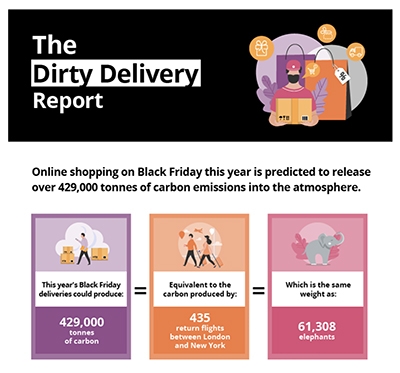
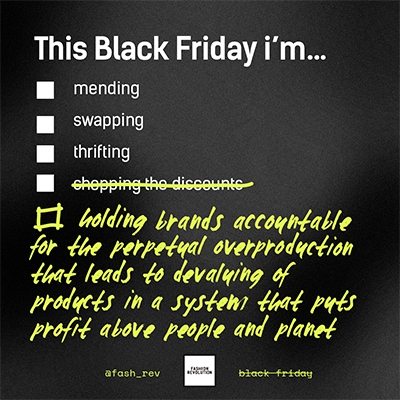
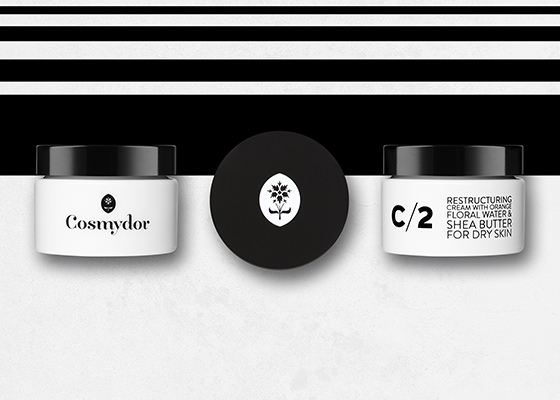
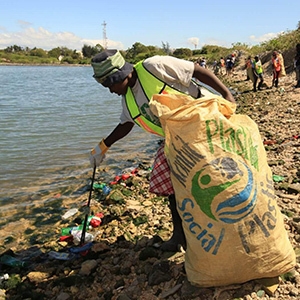




Trackbacks/Pingbacks